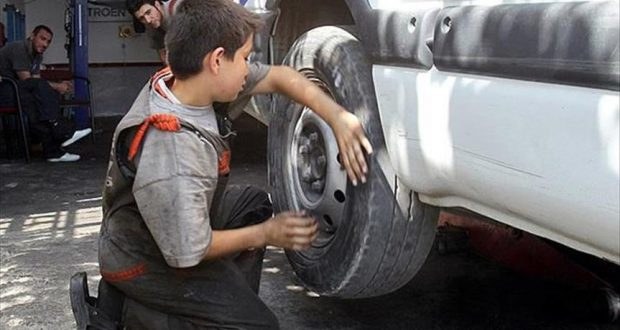AMMAN: Twelve-year-old Mamdouh said he has been on a seven-day street shift selling gum and candy to cover the needs of his family living in a refugee camp on the outskirts of Jordan’s capital, Amman.
“A small van drops us off here every day at 5 p.m. to sell gum and candies, and the driver comes at 10 p.m. to take us back to Wehdat,” Mamdouh said, accompanied by a 9-year-old girl and 10-year-old boy selling candy in Amman’s Al-Weibdeh neighborhood.
Insisting that no picture of him be used under fears of labor ministry inspectors, Mamdouh said his 56-year-old father has forced him to quit school and work to help feed their family.
Mamdouh lives in Al-Wehdat refugee camp, the second largest camp for Palestinian refugees in Jordan.
“We are six — two boys and four girls — but my father only allows my older brother and sister to go to school,” Mamdouh said, again insisting that no photo of him or his friends be used in the report.
“You are not an inspector from the labor and social development ministries, are you?” Mamdouh asked before telling his story to Arab News.
Government inspectors were seen looking for child workers and beggars in Al-Weibdeh, one of Amman’s oldest and most famous neighborhoods.
In a recent report on the World Day Against Child Labor, annually marked on June 12, Workers’ House, a local NGO specialized in labor rights, expected the number of working children in Jordan aged between 5 and 17 to reach 100,000 by the end of 2021, signaling an increase of 25 percent from the latest figures recorded in 2016.
The report warned against a “worrying” rise in the number of children who are victims of child labor as a result of the coronavirus disease (COVID-19) pandemic and the subsequent economic distress and rise in poverty and unemployment rates in Jordan in 2020.
The unemployment rate in Jordan reached around 24 percent in the third quarter of 2020, up by 4.8 percent compared to the same period in 2019, according to official figures.
The Workers’ House report said that the pandemic has seen around 80,000 people lose their jobs in Jordan in 2020, with authorities forcing businesses to close in a bid to stem the spread of COVID-19. The organization added that more than 500,000 workers have been facing pay cuts since March 2020.
The organization also explained that the poverty rate in Jordan has climbed to 26 percent in 2020, prompting families, “in the absence of a social protection system,” to send their children to the labor market to secure their daily living.
The report called for updated data on the impact of the pandemic on child labor, adding that the latest survey was in 2016, in which the number of working children was placed at 76,000.
Citing the 2016 survey, the NGO said that, of the 76,000 working children aged between 5 and 17, 70,000 were illegally employed, with around 45,000 of them found working in hazardous environments.
The report said that 29 percent, 28 percent and 11 percent of the working children registered in 2016 were working in retail businesses and auto repair shops, agriculture, and construction, respectively.
Labor Ministry Spokesman Mohammed Zyoud told Arab News that inspection teams have uncovered a total of 191 child labor cases from the 5,560 field visits they conducted during the first four months of this year.
He also said that the ministry’s inspectors had carried out a total of 11,952 and 7,143 field visits to businesses in 2020 and 2019 and discovered a total of 503 and 467 cases of child labor, respectively.
The spokesman also said that the ministry has taken a decision to intensify inspection campaigns and field visits during 2021 to curb child labor, which, he added, has been “increasing as a result of the COVID-19 pandemic and the accompanying economic difficulties.”
During a recent seminar at Al-Rai Center for Strategic Studies, Labor Minister Yousef Shamali said that government inspectors working in the specialized unit for child labor carry out inspection campaigns annually on businesses across the kingdom to check on their abidance with the Jordanian labor law, which prohibits the employment of children under 16.
He also explained that the child laborers recovered by the inspectors are referred to the social protection center, where they receive educational and psychological rehabilitation to able to go back to school or vocational training to qualify them to join the labor market when they reach legal age.
Shamali also explained that the ministry set up an online database for child labor in 2018 and is financing the Program on the Elimination of Child Labor, implemented by the Jordanian Hashemite Charity Organization.
The International Labor Organization said that the influx of refugees from Syria to Jordan has exacerbated the situation of child labor, in terms of both magnitude and complexity, adding that it is supporting the government in its implementation of the National Framework to Combat Child Labor, adopted in 2011.

























